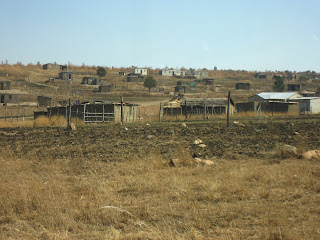
After a week on the loveTrain in rural South Africa, I was excited to go to La Palala game reserve with David Harrison and his family. La Palala is a private game reserve in the Limpopo province, not far from Botswana. It is the home to black rhinos, white rhinos, zebras, giraffes, impala, nyala, wildebeasts, warthogs, leopards and many more.
After driving for three hours through Gauteng and Limpopo provinces, we turned off the tar road and traveled into La Palala game reserve on the deep red dirt road, navigating around boulders and dashing nyala. Right past the entry gate, we were greeted by a herd of white rhinos and a pack of warthogs. The warthogs were bouncing around the rhinos, irritating them and causing them to stomp and snort, reminiscent of Pumba from
The Lion King.

We continued to wind through the reserve, keeping an eye out for animals and spotting zebras, giraffes, wildebeasts, impala, and more warthogs. Finally, we arrived at our campsite which was hidden among the trees and situated on a river bank. We idled away the afternoon reading in the sun and taking short walks through the bush in search of animals. As we walked through thick bush that engulfed our legs, David warned us about black mambas, cobras, and black scorpions, all of which are present in La Palala and quite poisonous. Although I was now a bit cautious, when we emerged from the bush and came to the top of a hill, I was blown away by the beauty of the red earth contrasting with the rich gold bush and vibrant green trees.
As night began to fall, we watched the nearly full moon rise and nighttime creep over the horizon. After a hearty dinner of campfire stew, we headed to bed keeping an eye out for snakes, scorpions, and leopards.
The next morning I awoke with the sun, refreshed and invigorated by the crisp air. I had made it through the night without being eaten by a leopard, bitten by a black mamba, or stung by a scorpion!
Ready for some game viewing, we quickly packed up camp and headed to meet a guide for a wilderness walk/hike. Because we were in dangerous black rhino territory, each adult was assigned to a child in the case of emergency. We were told that if we came across a black rhino that we were not to run but find a large tree and either climb it or hide behind it (very comforting to start a hike this way!).

Shortly after we began the climb, we came to ruins from an 18th century village. Remnants of grinding stones and iron tools created from the iron-rich earth, remained from the once inhabited village. On the top of the mountain, we came across more ruins from a 17th century village. Stone walls remained from the hilltop village, revealing floor plans from huts and the king's quarters.
Although we did not see any black rhinos on this hike, we did come across quite a lot of rhino dung and other animal dung. I was a bit taken aback when David's wife and daughter collected the heaping rhino dung and different animals' dung with their bare hands for show and tell in school! They told me not to worry because these animals mostly all ate plants, but for some reason, I did not find that comforting.
Our guide was quite knowledgeable about the terrain and the animals. When we came across hyena dung, he warned us not to touch any of the plants near the dung because hyenas mark their territory after excretion. If we touched any of the plants around there, our hands would smell horrendously for days on end! Avoiding any vegetation near there, we continued on, listening to stories about the people who inhabited these mountains many years ago. Our guide showed us the specific trees which were planted for performing sacrifices and the trees that were used to help young girls' breasts grow larger (not a pleasant procedure!).
At the end of the hike, we all climbed into the back of the guide's backie (pick up truck) for a true South African ride back to our cars. We drove through La Palala reserve and watched as giraffes, rhinos, and zebras grazed the fields. All in all, my first game reserve experience was rugged and beautifully natural.

















 This is a floor-to-ceiling sheet on which the residents of District Six wrote their names and addresses in District Six. A group of women volunteered to embroider over their names so they would be forever in history.
This is a floor-to-ceiling sheet on which the residents of District Six wrote their names and addresses in District Six. A group of women volunteered to embroider over their names so they would be forever in history.










